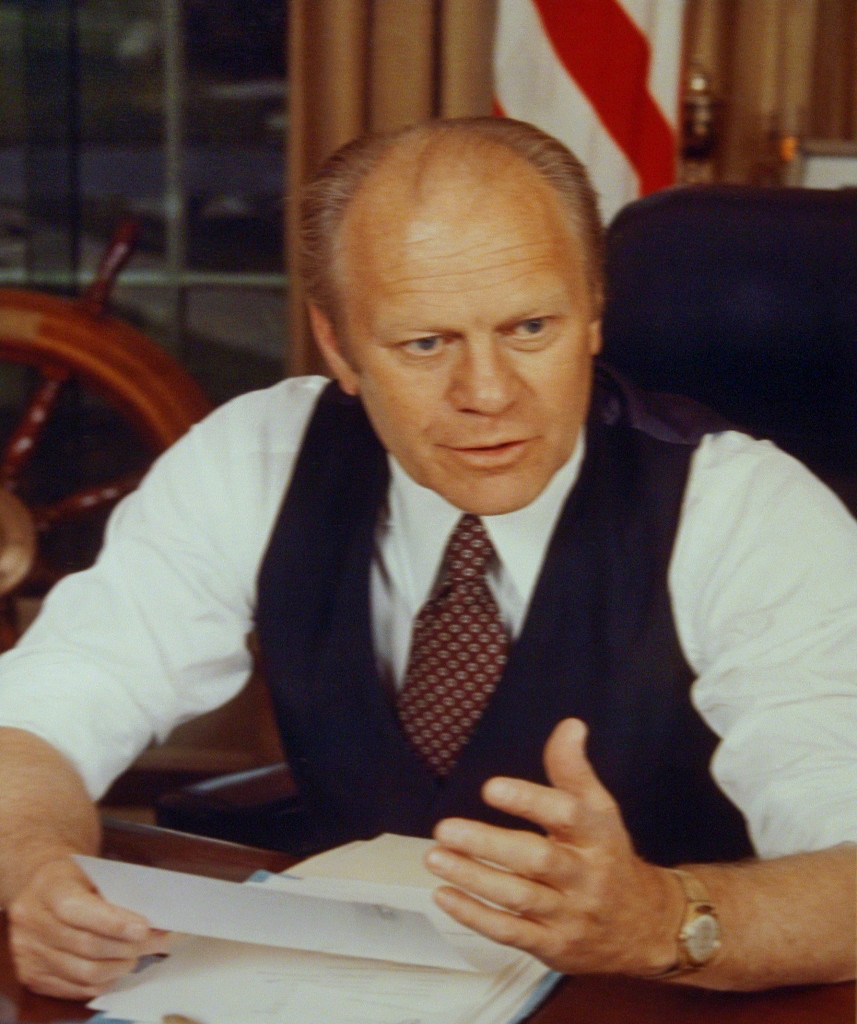Frames of reference are all around us. They exist in ways we often aren't entirely aware of, or at least don't care to notice.
One of my favorite examples involves former U.S. President Gerald Ford. Before he was president, Ford was an Eagle Scout, played on the University of Michigan football team, and served in the Navy. None of these activities would particularly lend themselves to a "clumsy" person. And yet, while disembarking from Air Force One when visiting Austria (in the rain, mind you), he tripped while descending the staircase.
The media, of course, had a field day with this. It was parodied extensively in an opening montage of Saturday Night Live. Everyone had a pretty good laugh. I guess there is something inherently funny about a man of such power that does something so...human.

It's a wonder he didn't fall over this table
Image Credit
Some time after the presidential tumble, Ford decided that he wanted to take a vacation skiing. The media were, of course, huge fans of this idea. Having been skiing once in my life, I will say that it is a sport where falling is pretty much a guarantee. The journalists were thinking the same thing, and rushed to the slopes with their cameras in hopes of getting a presidential blooper reel of hilarious skiing wipeouts.
Much to everyone's surprise, Ford turned out to be quite a skilled skier, and did not give the media a hilarious fall during his outing. The journalists left the slopes with no funny story.
I bring this up because I was not alive during the time of Ford's presidency, so I did not know much about it, all I know consists of the snippets I learned in history classes and pop culture. I couldn't tell you much about his policies or actions, but I somehow know about the fact that he tripped and fell when disembarking from Air Force One. Because of the overblown media coverage on the event, it has been cemented as a humorous anecdote about the president...even though it doesn't really tell the whole story.
President Ford was a skilled athlete, and yet he is remembered (by me at least) for the one time that he had a moment of clumsiness.
I wrote in a past article on how the media like to focus on statistical outliers in order to make a good story, so I'll refrain from spending more time talking about all the different ways reference frames are used by journalists, but I encourage you to always question the material when you watch the news, and ask yourself if it is really an accurate depiction of the world.
Reference Frames in Everyday Life
We use reference frames all the time, sometimes in trivial ways and other times not so much. When you see someone behind the counter at a coffee shop who is wearing an apron with the store's logo on it, you know that this is the person to whom you will give your order.
On a slightly deeper level, imagine that you are at a new job and are trying to learn a difficult concept from a senior employee. Before meeting this person, you are told that he is "brilliant." When you finally meet him, you see a man who has wildly unkempt hair and ragged clothes, and he talks very quickly using lots of technical jargon that you don't really understand.
In this scenario, the "brilliant" senior leader might not fit your expectation (or maybe he does), but because other people (who we assume you trust) framed this person as "brilliant", you listen to what he has to say and disregard his appearance.
Now, what if you met the same man, except this time he was given no introduction, and instead of meeting him in your office, you met him on a street corner. He starts blabbering about the same technical jargon, but this time you disregard it as the crazy talk of an insane homeless person.
In the second scenario, your reference frame has changed. The location combined with the man's lack of a reputation lead you to draw different conclusions about whether or not you should listen to him.
Reference frames can be practical, as often times we rely on situational clues to make informed decisions about things. It works most of the time, and I discuss it more in my article about image, but let's look at a way in which reference frames can be destructive.
The Case of the "Jerk"
Say you are talking with a friend, and they refer to another person who you haven't met. They say, "he's such a jerk," and don't give much else explanation. At that time, this "jerk" walks in the room.
Upon meeting him, you don't notice anything particularly "jerk-like" about him, but then he says something that is a bit off-putting. Once he leaves, you say to your friend, "you were right, he is a jerk."
What just happened to you was a classic case of a psychological principle known as the "self-fulfilling prophesy." As soon as this gentleman was "framed" as a jerk, you immediately were on the hunt like a bloodhound for jerk-like qualities. As soon as one popped up, you were right there to catch it. They could have said 100 nice things and 1 jerk-like thing, but you only noticed when they were a jerk.
Another thing you need to contemplate in that scenario is what your behavior was like. In thinking that this person was a jerk, did you act cold and/or short with them? If you did, then their "jerk-like" behavior was merely a reflection of your behavior. We give subtle cues in our conversation more than we think, and acting as if someone is a jerk may indeed turn them into one, at least when they are around you.
This may sound basic, but it is so often forgotten: if you want people to act friendly toward you, then you should act friendly toward them. It also explains why people who are mean to others so often complain about others being mean to them, and why people who are dramatic often complain about being involved in drama. There are many positive-feedback loops in social interaction, make sure you only get caught in the ones that you like.
Conclusion
Reference frames and labeling are a part of life, we can't hope to approach everything purely objectively. I think it is important, however, to always question the truths that you hold in your life about people, events, ideas, etc. Is that person you don't like really all that bad, or have you just not liked them for so long that you forget why? Was that world leader really that bad or are you just focusing on lots of circumstantial evidence that is beyond their control?
Reference frames are a useful survival mechanism, but they can so easily be exploited by those who know how to use them properly.
We like to think that a bad frame won't make a priceless painting look like a child drew it, but it does more than we would like to believe.



